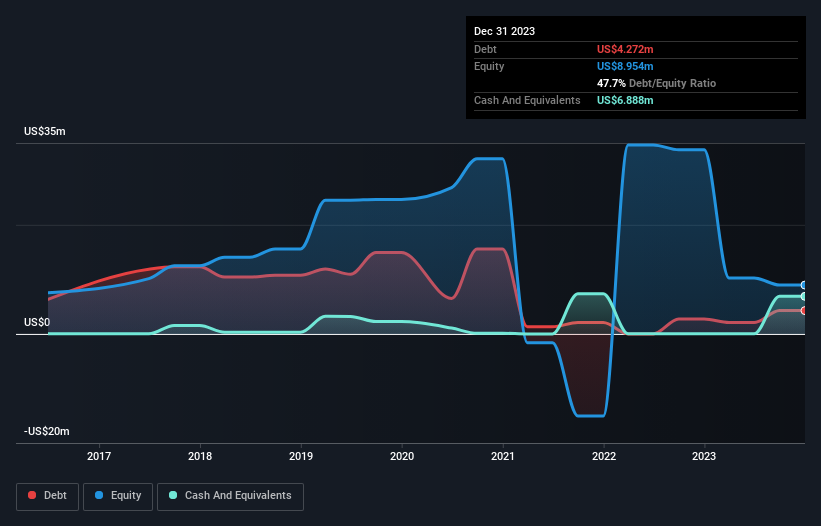Legendary fund manager Li Lu (who Charlie Munger backed) once said, 'The biggest investment risk is not the volatility of prices, but whether you will suffer a permanent loss of capital.' So it might be obvious that you need to consider debt, when you think about how risky any given stock is, because too much debt can sink a company. We can see that Bit Origin Ltd (NASDAQ:BTOG) does use debt in its business. But the real question is whether this debt is making the company risky.
When Is Debt A Problem?
Debt and other liabilities become risky for a business when it cannot easily fulfill those obligations, either with free cash flow or by raising capital at an attractive price. Ultimately, if the company can't fulfill its legal obligations to repay debt, shareholders could walk away with nothing. While that is not too common, we often do see indebted companies permanently diluting shareholders because lenders force them to raise capital at a distressed price. Having said that, the most common situation is where a company manages its debt reasonably well - and to its own advantage. The first thing to do when considering how much debt a business uses is to look at its cash and debt together.
View our latest analysis for Bit Origin
What Is Bit Origin's Debt?
As you can see below, at the end of December 2023, Bit Origin had US$4.27m of debt, up from US$2.72m a year ago. Click the image for more detail. But on the other hand it also has US$6.89m in cash, leading to a US$2.62m net cash position.

A Look At Bit Origin's Liabilities
The latest balance sheet data shows that Bit Origin had liabilities of US$1.63m due within a year, and liabilities of US$2.88m falling due after that. Offsetting these obligations, it had cash of US$6.89m as well as receivables valued at US$1.46m due within 12 months. So it actually has US$3.84m more liquid assets than total liabilities.
This excess liquidity suggests that Bit Origin is taking a careful approach to debt. Because it has plenty of assets, it is unlikely to have trouble with its lenders. Simply put, the fact that Bit Origin has more cash than debt is arguably a good indication that it can manage its debt safely. When analysing debt levels, the balance sheet is the obvious place to start. But you can't view debt in total isolation; since Bit Origin will need earnings to service that debt. So if you're keen to discover more about its earnings, it might be worth checking out this graph of its long term earnings trend.
Over 12 months, Bit Origin reported revenue of US$7.1m, which is a gain of 215%, although it did not report any earnings before interest and tax. That's virtually the hole-in-one of revenue growth!
So How Risky Is Bit Origin?
By their very nature companies that are losing money are more risky than those with a long history of profitability. And the fact is that over the last twelve months Bit Origin lost money at the earnings before interest and tax (EBIT) line. Indeed, in that time it burnt through US$8.3m of cash and made a loss of US$31m. With only US$2.62m on the balance sheet, it would appear that its going to need to raise capital again soon. Importantly, Bit Origin's revenue growth is hot to trot. While unprofitable companies can be risky, they can also grow hard and fast in those pre-profit years. The balance sheet is clearly the area to focus on when you are analysing debt. However, not all investment risk resides within the balance sheet - far from it. For instance, we've identified 5 warning signs for Bit Origin (4 can't be ignored) you should be aware of.
At the end of the day, it's often better to focus on companies that are free from net debt. You can access our special list of such companies (all with a track record of profit growth). It's free.
Valuation is complex, but we're here to simplify it.
Discover if Bit Origin might be undervalued or overvalued with our detailed analysis, featuring fair value estimates, potential risks, dividends, insider trades, and its financial condition.
Access Free AnalysisHave feedback on this article? Concerned about the content? Get in touch with us directly. Alternatively, email editorial-team (at) simplywallst.com.
This article by Simply Wall St is general in nature. We provide commentary based on historical data and analyst forecasts only using an unbiased methodology and our articles are not intended to be financial advice. It does not constitute a recommendation to buy or sell any stock, and does not take account of your objectives, or your financial situation. We aim to bring you long-term focused analysis driven by fundamental data. Note that our analysis may not factor in the latest price-sensitive company announcements or qualitative material. Simply Wall St has no position in any stocks mentioned.
About NasdaqCM:BTOG
Flawless balance sheet with moderate risk.
Market Insights
Weekly Picks

Early mover in a fast growing industry. Likely to experience share price volatility as they scale


A case for CA$31.80 (undiluted), aka 8,616% upside from CA$0.37 (an 86 bagger!).


Moderation and Stabilisation: HOLD: Fair Price based on a 4-year Cycle is $12.08
Recently Updated Narratives

Micron Technology will experience a robust 16.5% revenue growth

Amazon will rebound as AI investments start paying off by late 2026


Inside Harvey Norman: Asset-Heavy Retail in an Online World
Popular Narratives


A case for CA$31.80 (undiluted), aka 8,616% upside from CA$0.37 (an 86 bagger!).

Early mover in a fast growing industry. Likely to experience share price volatility as they scale


NVDA: Expanding AI Demand Will Drive Major Data Center Investments Through 2026
Trending Discussion



